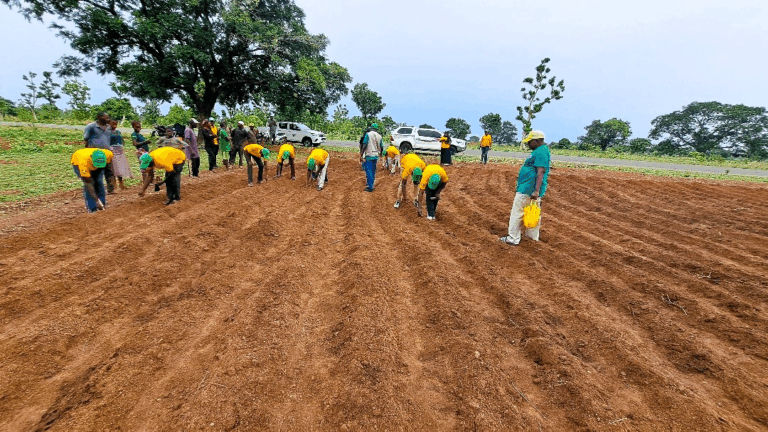The Sasakawa Africa Association Nigeria (SAA Nigeria), with funding from The Nippon Foundation (TNF), has commenced the distribution of critical farm inputs to 9,000 smallholder farmers across six Nigerian states—Kano, Jigawa, Gombe, Nasarawa, Benue, and Kwara.
The intervention, which is part of SAA’s 2025 Wet Season programme, aims to enhance food security, improve rural livelihoods, and promote climate-smart agriculture. The initiative will also benefit an estimated 45,000 farmers indirectly.
Certified seeds, fertilizers, and agrochemicals are being distributed to support early planting and improve productivity.
This was confirmed in a statement signed by Moses Nongoatse, Communication Officer (COMMO)Sasakawa Africa Association Nigeria and made available to Grassroots Parrot on Friday.
The statement quoted the Country Director of SAA Nigeria, Dr. Godwin Atser, as noting that the distribution is complemented by the establishment of 360 community demonstration plots in 90 rural communities across the six target states.
Atser said these Farmer Learning Platforms (FLPs) will promote regenerative agriculture and showcase practical innovations such as intercropping, Urea Deep Placement (UDP), mulching, integrated pest and weed management, and sustainable soil fertility techniques.
READ ALSO: Sasakawa Advocates For Farmer Clusters To Improve Productivity.
“For more than 30 years, we have worked side by side with Nigeria’s smallholder farmers, delivering practical, field-tested innovations,” said Dr. Atser.
“Our interventions have consistently improved yields—from 1.9 MT/ha to 5.5 MT/ha in maize, and from 1.8 MT/ha to 6 MT/ha in rice. Soybean and cowpea yields have also grown from 0.6 MT/ha to 2.5 MT/ha as a result of our combined approach to input supply, hands-on training, and field-based learning.”
As part of its preparatory efforts, SAA also conducted a Preseason Training-of-Trainers (ToT) programme involving 116 frontline extension agents, who will be cascading regenerative agriculture techniques and good agronomic practices to farmers at the grassroots.
Speaking on the impact of SAA’s work in Gombe, the Commissioner for Agriculture, Animal Husbandry and Cooperatives, Dr. Barnabas Malle, commended the initiative.
“SAA has consistently demonstrated a high level of commitment to improving farmers’ livelihoods in our state. Their interventions—particularly in training, extension support, and timely delivery of farm inputs—have contributed meaningfully to nutrition, food security, and rural development,” Dr. Malle said.
At the flag-off event in Kano, the Managing Director of the Kano State Agricultural and Rural Development Authority (KNARDA), Dr. Farouk Kurawa, represented by SAA’s Kano State Coordinator, Mr. Kassim Safiyyanu, described the intervention as timely and farmer-focused.
“Sasakawa’s approach is practical and result-oriented. The early distribution of inputs enables farmers to plant on time, which is vital for achieving high yields,” he said.
Also speaking, the Technical Coordinator for Regenerative Agriculture at SAA Nigeria, Dr. Bello Shehu, emphasized the need for field teams to strictly adhere to established protocols for demo plot setup and urged farmers to take full advantage of the support.
READ ALSO: Postharvest Losses: Sasakawa Launches Training For Local Machine Fabricators
“This is more than just about seeds and fertilizers—it’s about building resilience through knowledge and sustainable practices,” Dr. Shehu said.
In Nasarawa, State Coordinator of SAA, Mrs. Salome Sabo, highlighted the timeliness of the distribution.
“This activity reinforces SAA’s leadership in the sector. The early support empowers our farmers to plan properly and embrace innovations that directly enhance their productivity and livelihoods,” she said.
As the season progresses, the statement reiterated the SAA Nigeria commitment to strengthening collaboration with government institutions, development agencies, and local farming networks to scale regenerative agriculture and sustainable intensification practices nationwide.
“Our inclusive, science-based approach—grounded in technology transfer, capacity building, and community demonstration—is helping transform smallholder agriculture into a resilient, productive engine of food security and rural prosperity,” it said.

